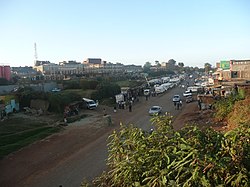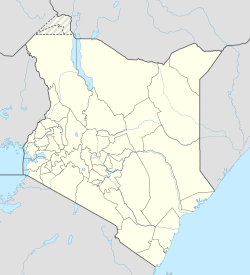Kenneth Stanley Njindo Matiba was a Kenyan politician and an activist for democracy who came in at second place in the 1992 presidential election. In November 2007, he announced that he would stand as a presidential candidate in the December 2007 election, where he was placed seventh, with 8,046 votes.
Education in Kenya refers to the education system in Kenya. It is considered a basic right that should be offered to every individual. Education in Kenya predates to as early as the 18th century among the Swahili people. The earliest school was established by missionaries in Rabai. During colonial rule, a limited number of Kenyans were able to access higher education opportunities abroad.
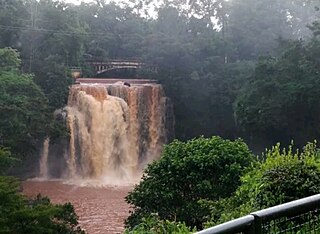
Thika is an industrial town and commerce hub in Kiambu County, Kenya, lying on the A2 road 42 kilometres (26 mi), northeast of Nairobi, near the confluence of the Thika and Chania Rivers. Although Thika town is administratively in Kiambu County, the greater Thika area comprising residential areas such as Bendor estate, Maporomoko, Thika Greens, Thika Golden Pearl, Bahati Ridge, and Thika Sports Club, among others, are within Murang'a County. Thika has a population of 279,429 which is growing rapidly, as is the entire greater Nairobi area. Its elevation is approximately 1,631 metres (5,351 ft).
Kiambu is a town in Kiambu County, Kenya. It is 14 km (8.7 mi) from the capital Nairobi. It is the capital of Kiambu County, which bounds the northern border of Nairobi. Other proximate towns are Ruiru, Gatundu, Limuru and Kabete.

Machakos County is one of the 47 counties of Kenya, which came into being because of the devolved system of governance occasioned by the 2010 constitution of Kenya. The country's first administrative headquarters are in Machakos Town, which is the largest town in the county. The county had a population of 1,421,932 as of 2019. The county borders Nairobi and Kiambu counties to the west, Embu to the north, Kitui to the east, Makueni to the south, Kajiado to the south west, and Muranga and Kirinyaga to the north west.

John William Arthur was a medical missionary and Church of Scotland minister who served in British East Africa (Kenya) from 1907 to 1937. He was known simply as Doctor Arthur to generations of Africans.

Presbyterian Church of East Africa (PCEA) is a Presbyterian denomination headquartered in Nairobi, Kenya. In Kenya, 10% of the population is Presbyterian. It was started by missionaries from Scotland, most notable of whom was Dr John Arthur. It has its headquarters in Nairobi South C.

Gatundu is a small town in Kiambu County of Kenya. It is known for the first Kenyan president Jomo Kenyatta who lived about three kilometres away from the town, as well as his son, Uhuru Kenyatta, now the 4th President of Kenya and former Member of Parliament representing Gatundu South Constituency. The town is located on a hill surrounded by many farms and residences.
Karatina is a town in Nyeri County, Kenya which hosts a municipal council and serves as the headquarters of Mathira East district. Karatina municipality has a total population of 6,852, all classified as urban. It has six electoral wards, all in the Mathira Constituency; the remaining five wards of Mathira constituency represent Nyeri County Council.
Kibwezi is a town in Makueni County, Kenya.

Margaret Wambui Kenyatta was a Kenyan politician. She was the daughter of the first President of Kenya, Jomo Kenyatta, and his wife Grace Wahu. She served as the mayor of Nairobi from 1970 to 1976 and as Kenya's Permanent Representative to the United Nations from 1976 to 1986. She was thereafter appointed as a Commissioner with the Electoral Commission of Kenya from 1992 to 2002.
Banana Hill is a suburb of Karuri town, in the eastern part of Kiambu County, Kenya. Banana Hill's population constitutes 20 percent of the estimated 100,000 residents within Kiambaa Constituency.
Dagoretti is an area in the western part of Nairobi, the capital of Kenya. It straddles the Nairobi and Kiambu County boundary with the Dagoretti Road Reserve marking the psychological border point heading Northerly and North-Easterly. Administratively it is one of eight divisions of Nairobi. The Dagoretti division is divided into six Locations. The former electoral Dagoretti Constituency had the same boundaries as the now defunct Dagoretti division.
Ndeiya is located in Kiambu County, Kenya, and is near the Great Rift Valley. The name is derived from a Maasai word.
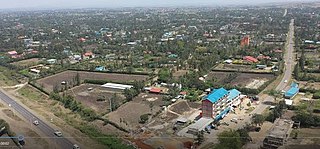
Kamulu is a neighbourhood in Nairobi City County located to the North East of the Nairobi Central Business District (CBD). It borders Joska (Matungulu) in Machakos County to the east, Mwalimu Farm Ruiru to the north, Njiru to the west, and Mihang'o to the south west.
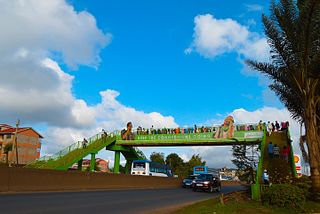
Uthiru is a settlement transversing in both Nairobi County and Kiambu County on the northwest side of the city centre of Nairobi. It is located between Kikuyu and Kangemi. The number of residents likely exceeds 100,000. It hosts a number of public institutions including University of Nairobi, Upper Kabete Campus, Kabete national polytechnic, and AHITI Kabete. ILRI has its headquarters in Uthiru.

James "Jim" Wathigo "Wat" Mburu,, better known by his stage names Jimwat and Jimweezy, is a Kenyan genge rapper.
